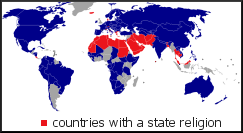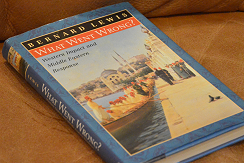(Sixth in a series comparing the social impact of theological differences between Christianity and Islam)
Islam teaches that Muhammad established an ideal society under Muslim law when he ran the government in Medina and eventually in Mecca. Most Muslims desire to return to that ideal by implementing Muslim law as closely as possible to the way that Muhammad would apply it under conditions that exist today.
Christianity teaches, on the other hand that, since the rebellion of mankind against God by Adam and Eve in the long-gone Garden of Eden, ideal civilization is impossible unless God establishes it himself. Christians believe Jesus is God, and they believe that Jesus will return to earth from heaven some day. Therefore, Christianity teaches that God will establish the ideal society on earth through Jesus. Christian waiting for Jesus is patient but not idle. Christians believe, that while Jesus is gone they should do the best at what they think Jesus would do, but they do not believe it is possible to have an ideal society without Jesus.
 These different visions for the future lead to different ways that Christians and Muslims engage in politics. Christians try to influence government and politics, but they no longer try to establish a theocratic government as the Byzantine emperors attempted from the fourth to the eleventh centuries. Jesus taught that his dominion was spiritual and non-material. He told the Roman governor who ordered his crucifixion, that if his kingdom had been of this world his followers would have been fighting for him (John 18:36). He told the Jewish leaders who wanted to rebel against Rome to pay their Roman taxes. He said “give to Caesar what is Caesars’ and to God what is God’s” (Matthew 22:17-21). This teaching from Jesus establishes the concept in Christian theology for of a separation of powers between church and state.
These different visions for the future lead to different ways that Christians and Muslims engage in politics. Christians try to influence government and politics, but they no longer try to establish a theocratic government as the Byzantine emperors attempted from the fourth to the eleventh centuries. Jesus taught that his dominion was spiritual and non-material. He told the Roman governor who ordered his crucifixion, that if his kingdom had been of this world his followers would have been fighting for him (John 18:36). He told the Jewish leaders who wanted to rebel against Rome to pay their Roman taxes. He said “give to Caesar what is Caesars’ and to God what is God’s” (Matthew 22:17-21). This teaching from Jesus establishes the concept in Christian theology for of a separation of powers between church and state.
Muslim theology has no such church-state separation paradigm. The Muslim ideal strives for uniting political and religious power rather than separating those powers.
Nation states and empires are inevitably violent. Governments arm policemen, field armies, and produce weapons, not priests and imams or mosques and churches. And governments use those armies and weapons to violently defend or advance their ideologies. The United States of America defends and advances democracy with great violence.
When Christians have been violent (as in the Crusades, the Inquisition, and today’s “war on terror”), it is for political rather than religious reasons. But today’s violent Muslim non-state actors are violent precisely because they are attempting to establish a Muslim state. It’s not Islam as a religion that is violent, but Islam as a political system. And because the Muslim ideal is a Muslim state, Islam will always be violent, because states will always be violent.
Christianity grew and thrived for over three centuries as a persecuted religion in both Roman and Persian empires. But, as Bernard Lewis writes in his book What Went Wrong (published by Oxford University Press in 2002),
 “Muhammad achieved victory and triumph in his own lifetime. He conquered his promised land, and created his own state, of which he himself was supreme sovereign. As such, he promulgated laws, dispensed justice, levied taxes, raised armies, made war, and made peace. In a word, he ruled, and the story of his decisions and actions as ruler is sanctified in Muslim scripture and amplified in Muslim tradition” (p. 101).
“Muhammad achieved victory and triumph in his own lifetime. He conquered his promised land, and created his own state, of which he himself was supreme sovereign. As such, he promulgated laws, dispensed justice, levied taxes, raised armies, made war, and made peace. In a word, he ruled, and the story of his decisions and actions as ruler is sanctified in Muslim scripture and amplified in Muslim tradition” (p. 101).
Lewis also notes,
“The idea that any group or persons, any kind of activities, any part of human life is in any sense outside the scope of religious law and jurisdiction is alien to Muslim thought. There is, for example, no distinction between cannon law and civil law, between the law of the church and the law of the state, crucial in Christian history. There is only a single law, shari’a, accepted by Muslims as of divine origin and regulating all aspects of human life: civil, commercial, criminal, constitutional, as well as matters more specifically concerned with religion in the limited, Christian sense of that word” (p. 100).
This post has covered differences between Muslim and Christian beliefs about future world civilization. Both Christianity and Islam are idealistic and triumphal, however, Christians believe that only Jesus can establish an ideal society while Muslims strive for an ideal civilization on the earth through Muslim government and law. The results of these theological differences play out everywhere on the world stage. Politicians and diplomats ignore or minimize these differences to their peril. The next post in this series will explore Muslim and Christian differences in beliefs about divine revelation.
Link through the chart to other posts on the social impact of Muslim and Christian theology:








 http://www.faithandwar.org
http://www.faithandwar.org Mark Durie's Blog
Mark Durie's Blog Military Missions Network
Military Missions Network The Christian Fighter Pilot
The Christian Fighter Pilot The Navy Christian
The Navy Christian
One thought to “What Do Muslims and Christians Believe Differently About the Future?”